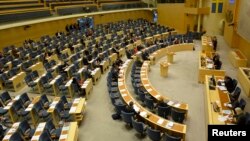Sweden's far-right is gambling its political future in pitching the country into snap elections, calculating disaffection with established parties and fears over immigration can further its meteoric rise from a pariah-like obscurity to mainstream power.
But voters may yet punish the Sweden Democrats, who want to cut asylum seekers by 90 percent, for tipping the balance in a vote over the budget on Wednesday and forcing a Social Democrat-Green coalition to call polls after only 2 months. Turmoil is an alien spectacle in Swedish political culture.
“If they succeed in conveying an image that they are a strong, established party that has pushed this through, they may at least to some extent be rewarded for it,” Gothenburg University Professor Folke Johansson said.
“But if they are perceived as having thrown a spanner in the works and been looking for a fight, they will do badly.”
The campaign, pitching the Sweden Democrats against parties of the left and right who shun them, will determine whether they are entrenched as king makers - potentially redrawing the political landscape - or sidelined for years to come.
“We see a big opportunity with a new election,” Sweden Democrat MP Martin Kinnunen told Reuters. “We can raise the question of immigration even higher up on the agenda.”
Kinnunen's party may well improve on the 13 percent it polled in September.
“The most likely thing is that the Sweden Democrats, which is most clearly the party for the discontented, will benefit from this,” said Torbjorn Sjostrom, CEO of pollsters Novus.
The far-right is on the rise across Europe, fed by disillusionment with the establishment, economic hardship and worries over immigration.
In Sweden's neighbor Denmark, the Danish People's Party has seen its support soar on a platform of tight immigration, tougher punishment for criminals and more welfare spending, apparently on track to become the country's biggest party.
There are, however, also lessons of caution to be learned beyond Swedish frontiers.
The Dutch far-right Freedom Party, forced an early general election in 2012, but ended up the biggest loser partly as some voters blamed leader Geert Wilders for stirring a crisis.
A poll by Demoskop in tabloid Expressen showed voters blaming Social Democrat Prime Minister Stefan Lofven and Jimmie Akesson, leader of the Sweden Democrats, equally for Sweden's current crisis.
New landscape
Mainstream parties can still sideline the far-right, but that requires left and right bridging a divide that has deepened over the past decade.
“Nothing indicates either bloc will win a majority on their own,” said Bengt Westerberg, a liberal minister in the 1990s and one of the last center-right leaders to seek rapprochement with the left before the two blocs recoiled in mutual animosity.
“If they want to prevent the Sweden Democrats from gaining influence they must be prepared to break up the bloc politics.”
The longer that political deadlock lasts, the more the pressure will build on either center-right or center-left to finally bring the Sweden Democrats in from the cold.
As head of the weakest government in decades, Prime Minister Lofven has repeatedly sought accommodation with the four center-right parties that formed the previous Alliance government.
They are reluctant to cooperate, fearing this could effectively cement the role of the center-right as junior parties in governments led by the Social Democrats, the country's biggest party for most of the last 100 years.
Under charismatic leader Akesson, the Sweden Democrats have disowned their roots on the neo-nazi fringe, promoting a nostalgic view of “family values” and economic conservatism.
One model for the Sweden Democrats might be France's National Front.
Once burdened with a reputation for racism and xenophobia, it has moved into the mainstream under the leadership of Marine Le Pen, broadening its appeal by directing ire against Brussels and EU bureaucracy.





